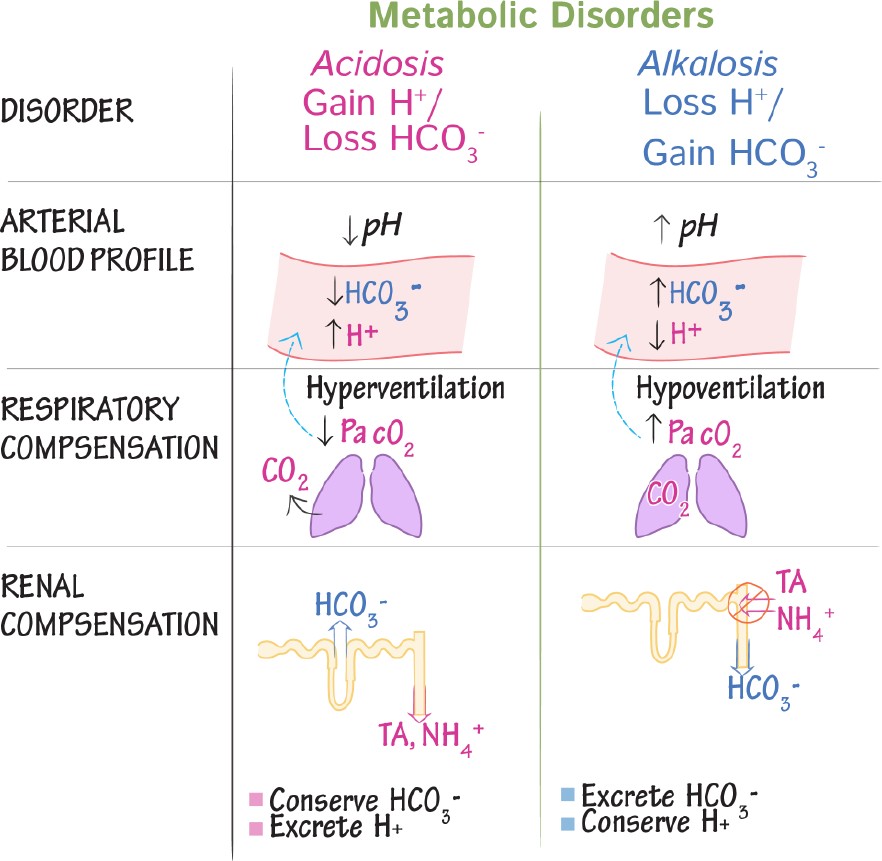A nurse is caring for a patient who has acute kidney injury. The patient's ABG results are: pH: 7.26
PaCO2: 30 mm Hg HCO3: 14 mEq/L
Which of the following acid-base imbalances should the nurse identify the patient is experiencing?
Metabolic alkalosis
Respiratory acidosis
Metabolic acidosis
Respiratory alkalosis
The Correct Answer is C
Choice A reason: Metabolic alkalosis is characterized by a high pH and a high HCO3 level, which is not present in this scenario.
Choice B reason: Respiratory acidosis is characterized by a high PaCO2 and a low pH. Although the pH is low here, the PaCO2 is also low, ruling out respiratory acidosis.
Choice C reason: Metabolic acidosis is indicated by a low pH and a low HCO3 level, which aligns with the patient's ABG results.
Choice D reason: Respiratory alkalosis would present with a high pH and a low PaCO2, which is not the case here.

Nursing Test Bank
Naxlex Comprehensive Predictor Exams
Related Questions
Correct Answer is C
Explanation
Choice A reason: Cisapride is a prokinetic agent that increases gastrointestinal motility and is unlikely to cause constipation.
Choice B reason: Magnesium-containing antacids typically cause diarrhea rather than constipation.
Choice C reason: Opioid analgesics are known to slow gastrointestinal motility, which can lead to constipation, making this the correct answer.
Choice D reason: Statins are used to lower cholesterol and are not commonly associated with causing constipation.
Choice E reason: Anticholinergic/antispasmodic medications can cause constipation due to their action on the nervous system, which reduces muscle contractions in the gastrointestinal tract.
Correct Answer is A
Explanation
The correct answer is Choice A
Choice A rationale: Placing the patient in a supine position with knees flexed reduces tension on the abdominal wall and minimizes strain on the surgical site. This position promotes relaxation of the rectus muscles and decreases intra-abdominal pressure, which helps prevent further wound separation and evisceration. It also facilitates optimal circulation and allows for rapid assessment and intervention. Scientifically, this positioning is a first-line response to wound dehiscence and aligns with evidence-based emergency protocols.
Choice B rationale: Covering the wound with a clean towel does not meet sterile technique standards required for exposed internal tissues. In cases of dehiscence, especially with evisceration, sterile saline-soaked gauze is necessary to maintain tissue moisture and prevent infection. A clean towel may introduce contaminants and lacks the moisture-retaining properties needed to protect exposed organs. This action fails to meet scientific wound care principles and may compromise patient safety and healing.
Choice C rationale: Applying an abdominal binder to a dehisced wound can exert pressure on the compromised tissue and exacerbate separation. Binders are used prophylactically or postoperatively for support, not in acute dehiscence. Compression over an open or unstable wound risks ischemia, tissue damage, and impaired healing. Scientifically, this intervention is contraindicated during active wound separation and does not align with emergency wound management protocols.
Choice D rationale: Offering a drink of water is inappropriate during an acute surgical complication like wound dehiscence. Oral intake may be contraindicated due to potential need for surgical intervention or anesthesia. Additionally, hydration does not address the immediate risk of infection, tissue exposure, or hemorrhage. Scientifically, this action lacks relevance to the pathophysiology of dehiscence and may delay critical care. Priority should be stabilization and surgical evaluation, not fluid intake.
Whether you are a student looking to ace your exams or a practicing nurse seeking to enhance your expertise , our nursing education contents will empower you with the confidence and competence to make a difference in the lives of patients and become a respected leader in the healthcare field.
Visit Naxlex, invest in your future and unlock endless possibilities with our unparalleled nursing education contents today
Report Wrong Answer on the Current Question
Do you disagree with the answer? If yes, what is your expected answer? Explain.
Kindly be descriptive with the issue you are facing.
